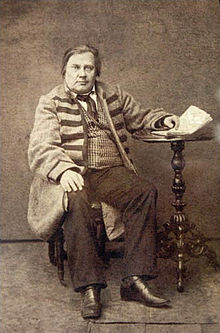- Vintsent Dunin-Martsinkyevich
-
Vincent Dunin-Marcinkievič (Belarusian: Вінцэнт (Вінцук) Дунін-Марцінкевіч; Polish: Wincenty Dunin-Marcinkiewicz; c. 1808 – 1884) was a Belarusian writer,[1] poet, dramatist and social activist and is considered as one of the founders of the modern Belarusian literary tradition[2] and national school theatre.[3]
Vintsent Dunin-Martsinkievich was born in a Belarusian[4] Polish–Lithuanian Commonwealth szlachta family in the region of Babruysk. He graduated from the medical faculty of the University of St. Petersburg.
He wrote both in contemporary Belarusian and Polish languages. Writing in modern Belarusian language he faced the problem of its being not standardized, as the written tradition of the Old Belarusian (Ruthenian) language had been largely extinct by that time.
From 1827 Dunin-Martsinkyevich lived and worked in Minsk as a bureaucrat. In 1840 he acquired a mansion near Ivyanets and went there to write most of his works.
In 1859 he translated into Belarusian language Adam Mickiewicz's epic poem Pan Tadeusz and published it in Wilno. Under the pressure of Russian Empire authorities he succeeded in publishing only the first two chapters of the poem. This was the first translation of the poem into another slavic language.[5]
Vintsent Dunin-Martsinkyevich was accused by the police in separatist propaganda during the January Uprising. He was arrested but later set free but kept under supervision by the police.
The writer was buried in Tupalshchyna, now Valozhyn rajon.
Most notable works
- Opera "Sielanka" (Belarusian: "Ідылія", English: "Idyll"; 1846) — the first play, written partly in contemporary Belarusian language.
- Poem "Hapon" (Belarusian: "Гапон"; 1855) — the first poem, written completely in contemporary Belarusian.
- Plays and poetry, some of them in contemporary Belarusian (1855–1861), some of them being:
- "Wieczernice i Opętany" (1856)
- "Interested? Read it! Three tales and brief verse" (Polish: "Ciekawyś? Przeczytaj! Trzy powiastki i wierszyk ulotny"; 1857);
- "Belarusian piper" (Polish: "Dudarz białoruski");
- "Bylicy, raskazy Nawuma" (Belarusian: "Быліцы, расказы Навума"; not published);
- "Chalimon na karanacji" (Belarusian: "Халімон на каранацыі"; not published);
- "Lucynka czyli Szwedzi na Litwie" (1861);
- Play "Pinskaya shlyakhta" (Belarusian: "Пінская шляхта", English: "Pinsk nobility"; 1866)
- The first Belarusian translation of A. Mickiewicz's "Pan Tadeusz" (1859; published only partly, the circulation confiscated almost immediately).
Note: proper names and place names are rendered in BGN/PCGN.
References
- ^ Вінцэнт Дунін-Марцінкевіч
- ^ (English) Philatelia.Net: The classical literature / Plots / Dunin-Marcinkievich Vincent
- ^ (Belarusian) Дунін-Марцінкевіч Вінцэнт // Мысліцелі і асветнікі Беларусі: Энцыклапедычны даведнік. Менск: Беларуская Энцыклапедыя, 1995. ISBN 985-11-0016-1
- ^ (German) Dunin-Marcinkievič Vincent // Weißrussische Anthologie: Ein Lesebuch zur weißrussischen Literatur (mit deutschen Überzetzungen). München: Verlag Otto Sagner, 1983. ISBN 3-87690-252-5
- ^ (Russian) Лапидус Н. И., Малюкович С. Д. Литература XIX века. М.: Университетское, 1992. P.147
External links
Categories:- 1808 births
- 1884 deaths
- People from Babruysk Raion
- Polish nobility
- Polish writers
- Belarusian writers
- Belarusian poets
- Belarusian translators
- Belarusian people stubs
Wikimedia Foundation. 2010.

